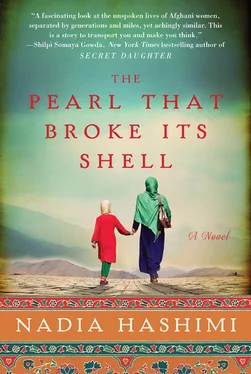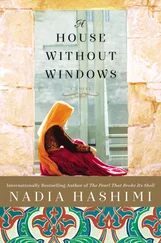“I’m not going to babysit you just because of what happened with Zamarud. You better look out for yourself,” Badriya said sharply. Kabul’s busy streets were coming into view. I turned and looked at her, not sure what she was implying.
“Fine with me. I didn’t think you were looking out for me before,” I said flatly, but I was too late to catch myself. Badriya’s eyes widened.
“Why, you insolent little…” Unable to find the words, she whipped the back of her hand against my face. My eyes watered and my nose stung. I prayed it wouldn’t bleed on my freshly washed dress. “Don’t you dare talk to me like that, you worthless girl. Just remember you’re here only because of me and I can change my mind about your usefulness anytime.”
I bit my tongue and looked out the tinted window.
We checked back into our room at the hotel. The apartment our husband had purchased needed a lot of work before we could stay there. He’d asked his guard and driver to find some local workers to replace the flooring and cover the windows. He didn’t want people or neighbors catching a glimpse of his wives.
Badriya set to unpacking right away, hanging her dresses in the closet.
I saw something that made my jaw drop. Our room had a television in it! It hadn’t been here on our last trip and Badriya had never mentioned having one before. I turned it on and saw Badriya watching me, very interested.
There was a knock on the door. I looked at Badriya.
“Don’t just stand there like an idiot. Find out who it is!”
It was the man we’d seen downstairs when we checked in. Our driver stood behind him, his arms crossed.
“Excuse me, khanum-ha, forgive me for intruding but it seems that we’ve forgotten one thing. May I enter please?” He looked back at Maroof, who nodded.
I stepped away from the door, turned to the side, and kept my head scarf pulled across my face. I didn’t need Maroof reporting anything back to my husband about my behavior. The man entered our room, turned the television off and unplugged it. He wrapped his arms around it and lugged it out the door while I watched, brokenhearted. I had seen about thirty seconds of a woman singing in a grass field, the small mirrors on her traditional Afghan dress catching the sun.
The door closed. Abdul Khaliq had a television back at the compound. A large box he kept in his own room, with an antenna that tracked to the roof of the house. We weren’t permitted to watch it. Once he’d caught me in there, eyeing it and fingering the buttons, daring myself to turn it on. I didn’t expect him to be home. He’d thundered into the room and grabbed me by the neck so hard I couldn’t breathe.
“What do you think you’re doing? Let me catch you watching television and I’ll rip your eyeballs out of their sockets!”
Khala Shaima had explained his reaction to me when I asked her if she had a television at home.
“Your husband is a lot of things but he’s not a stupid man. He knows what he’s doing. He doesn’t want you to see what’s going on in the rest of the country, what the other women are doing. These television stations now have so many programs, female singers, female news reporters. Even men advocating on behalf of women. Can you imagine that? Now can you imagine how you would feel if you were to see women like that every day? He needs to keep you blindfolded.”
The hotel manager had forgotten to remove the television before we got there. It angered me to realize how tight our leash was, even this far away from Abdul Khaliq. I felt like I was being buried in a hole, deeper and deeper every day until I could hardly see daylight.
At least returning to the jirga sessions was a break for me. And I was thankful to see Hamida and Sufia again. They greeted us with hugs and asked about our children. I couldn’t help but notice, happily, that they were warmer with me than they were with Badriya. I liked that they liked me.
The attack on Zamarud had frightened Badriya, as it had many other female parliamentarians. Hamida told me two women had decided not to return, afraid that they would be in danger as well. Zamarud was badly hurt, she said. Her wounds had gotten infected and she’d been hospitalized. She was not expected to survive.
The session opened with a prayer. I sat with Badriya, our heads bowed and our hands cupped. I spent the day filling out her papers and reading documents to her. She snapped at me for reading too slowly but I said nothing. It was easier that way. After the sessions and during our breaks, I would tag along with Hamida and Sufia, who were kind enough not to ask why I didn’t accompany Badriya. It was only within the parliament building that my husband’s driver and guard did not keep track of my whereabouts. Here, the leash slackened.
After the sessions, Badriya wanted Maroof and our guard to escort her back to the hotel. She had no interest in attending classes at the women’s training center but I certainly did. The guards had more stock in looking after Abdul Khaliq’s first wife, so they watched nonchalantly as I climbed into Hamida’s car, leaving me under the watch of her guard and driver.
We opened the door to the training center, which was, as usual, empty until we got there.
“Hello!” Ms. Franklin called out happily.
I wondered how she could be so cheerful all the time.
We alternated every day. One day she would teach basic English, and the following day we were back on the computer, learning to navigate the Internet or type notes. I thrilled at being a student again and longed for a real classroom, one full of boys my age whom I could learn with, joke with and play soccer with.
Ms. Franklin was proud of our progress. She said she’d told her parents all about us, about how impressed she was with our dedication, with our desire to work in government as women. I liked her praise. It had been a long time since I’d heard any.
So when the door opened, thirty minutes into our session, we were understandably intrigued to see who it was.
A tall, thin woman in her forties entered and looked around, unsure.
“Hello, come in!” Ms. Franklin said.
The woman wore a calf-length black jacket over a deep-plum-colored tunic and pants. Her ponytail was hidden by a plum-colored head scarf.
“ Salaam! ” she replied. “You are Ms. Franklin?”
Her name was Fakhria and she put Ms. Franklin in a tricky situation. She worked at a women’s shelter here in Kabul and wanted to attend the classes at the resource center. Ms. Franklin looked mildly perplexed. The funds that supported the center were specifically allocated to women parliamentarians. The classes were not open to the public because, theoretically, the center couldn’t accommodate more than the women jirga members. But so few of them came.
Ms. Franklin pursed her lips and waved Fakhria in, as I would have done. Somehow, she was not a woman you could turn away easily.
At the end of the class, Hamida asked Fakhria about the shelter. She and Sufia had heard of a women’s shelter but hadn’t ever seen it. I was surprised to hear such a place existed.
“My sister was killed by her husband. I decided I needed to do something and then I came upon this shelter. It was founded by an Afghan woman who was living in America. She raised money and emptied her pockets into building this place for girls. She travels back and forth now but we have a few people who look after the shelter.”
“And your husband, he doesn’t mind you spending time there?” Sufia asked gently.
“No, he is very supportive actually. He’s a kind man, my husband. After what happened with my sister, he knew I would go crazy just sitting there in mourning. We’ve got five children to keep me busy at home but I needed to do this. I wanted my children to see me do something.”
Читать дальше












